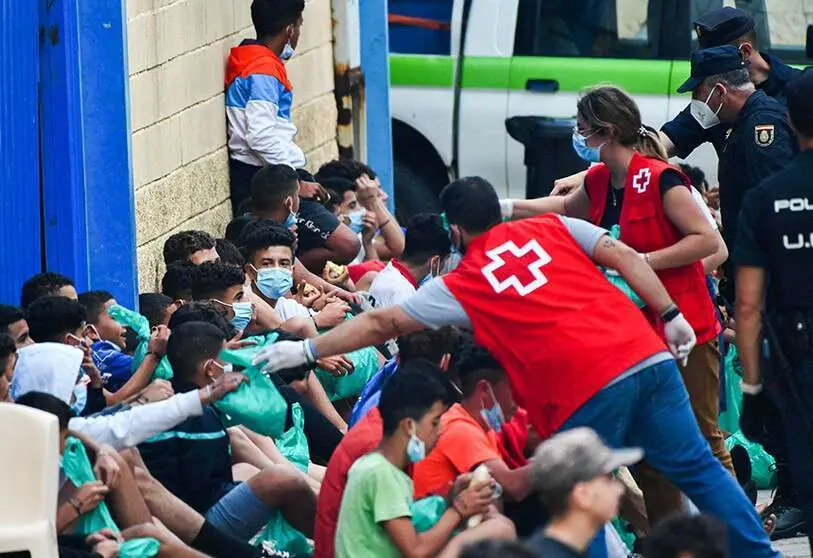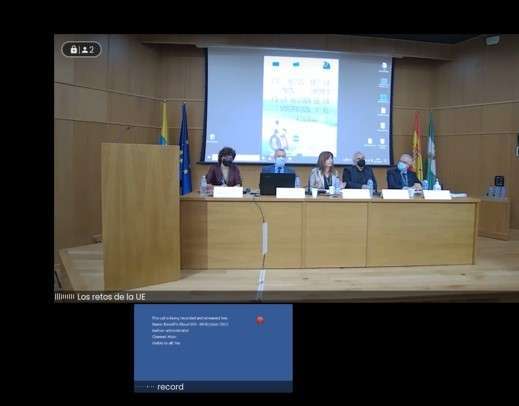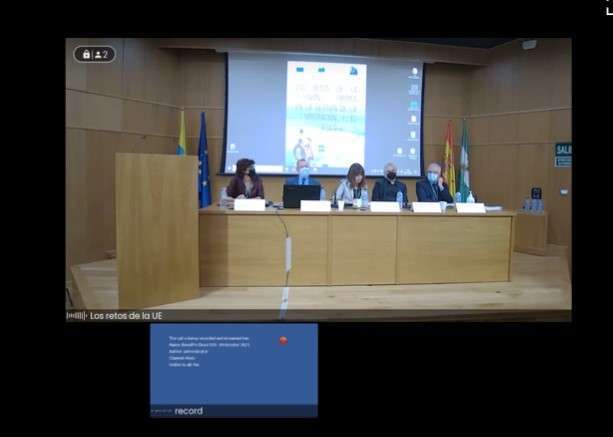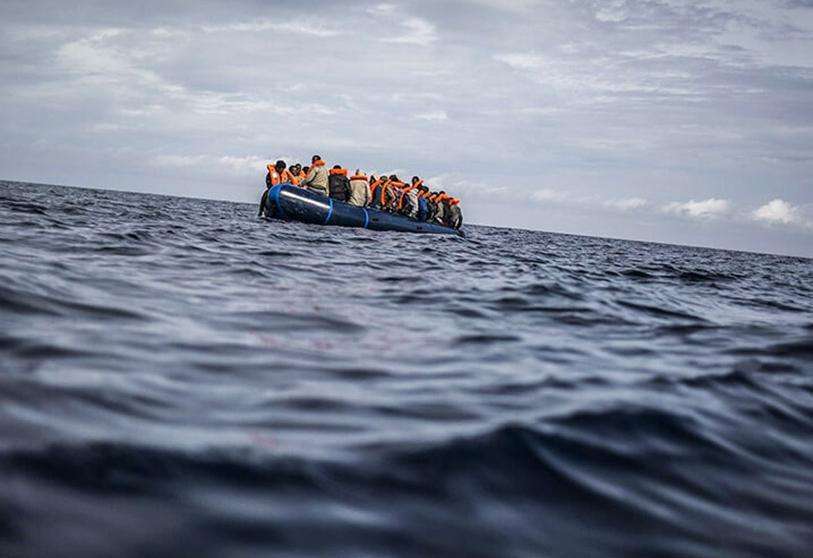Inmaculada Marrero: "Spain has to lead the European Union's relations with Morocco"

Brahim Ghali's entry into Spain triggered a delicate diplomatic crisis with Morocco that jeopardised cooperation relations. After the Polisario leader's presence on Spanish territory became evident, the Alawi kingdom recalled its ambassador to Spain for consultations. Days later, in the early hours of 17 May, thousands of Moroccans crossed the Spanish border in the face of the passivity of Moroccan security forces with the aim of reaching Ceuta. Although many managed to reach Spain, the "refoulements" did not take long to occur, and the European Union reopened the debate on the issue of migration and border security.
Within this framework, on the last day of the celebration of "the challenges of the European Union in the management of immigration and asylum", an event promoted by the European Movement in collaboration with the National University of Distance Education (UNED), a series of questions were addressed with the aim of providing keys and solutions to the problem that the Union is going through in terms of migration, especially with the countries that form part of the southern neighbourhood.
The last session was attended by the president of the Spanish Federal Council of the European Movement, Francisco Aldecoa, accompanied by the president of the Andalusian Council of the European Movement, Mari Cruz Arcos, and the Scientific Coordinator and General Rapporteur of the event, Pablo Antonio Fernández.
For this reason, the first part of the seminar featured Carlos Echevarría Mellado, professor of international relations at the UNED and deputy director of the General Gutiérrez Mellado University Institute, who stressed the importance of the European Union in relations with Morocco, since, he said, "there is a Spanish-European border" in which our southern neighbourhood "is not only Morocco", since the "Algerian-Moroccan binomial is serious".

Referring to the Spanish-Moroccan diplomatic crisis, the professor maintained that "Morocco has played some cards in a complicated game", but nevertheless, "it continues to consider Europe as a priority". He argues that despite the fact that we have witnessed "how Morocco is becoming more and more ambitious in building relations with China, the Gulf countries and the United States, Morocco continues to depend to a large extent on the European Union". And herein lies the real symbolic importance of European-North African relations, since for Echevarría "the important thing is that Morocco considers Europe to be a priority".
In this respect, he considers that compared to how other migratory crises have been managed in the past, "Europe has a trump card to play with Morocco with fewer complexes than it has played with until now".

Referring to the immigration crisis, he stressed that "the migratory crisis is above all Algerian, since thousands of Algerian immigrants arrive on the coasts of eastern Spain".
In the second part, a round table discussion dealt with the migratory crisis in the context of Spanish-Moroccan relations. The presentation was opened by Inmaculada Marrero Rocha, professor of international relations at the University of Granada and executive secretary of the Euro-Arab Foundation for Higher Studies. In her speech, she stated that "the crisis unleashed with the entry of Brahim Ghali caused relations to undergo a significant crisis that led to Morocco allowing undocumented immigrants to pass through, the majority of whom were minors".
The professor went on to affirm that "Spanish management of this crisis has been criticised within our borders", however, "Moroccan management received the greatest criticism outside its borders, above all for the issue of Moroccan minors".

"Although King Mohammed VI's words declared the crisis between Spain and Morocco to be over, the arrival of the ambassador in Madrid has not yet been made effective, nor has a date been set for the bilateral summit". It points out that this new episode "unearthed the phrase that they are condemned to understand each other".
After the end of the crisis, "the traditional accusations of not knowing or not having enough expertise to build relations with Morocco have reappeared", which is why "we need a state policy, a comprehensive strategy, and Spain has to lead the European Union's relations with Morocco, it has to materialise it".
In the same way, he points out that this crisis has not been the "first time that there has been a migratory conflict, nor that the ambassador has been called for consultations", and that "changing the structure of relations is complex".
However, he emphasised that "although it does not appear in the media" in many areas "we understand each other very well and we have more than overcome our differences". He stresses that "Spain has always been Morocco's main trading partner" and that "the chains of both countries are already complementary after the liberalisation of the agricultural sector, in addition to the millions of dollars invested in Morocco by Spanish businessmen".

There is something very much in common, and that is that "Morocco wants to have support in the European Union, which suits both Morocco and Spain". For Morocco, cooperation with the EU "means that they have better conditions of access", he pointed out.
With regard to the points in common in Spanish-Moroccan relations, Marrero affirms that "cooperation in security and intelligence is going perfectly, especially since 2004, when the Atocha attacks took place". As for cultural cooperation, he says that "there are a large number of foundations and associations in the social and cultural sphere with Morocco, and in Andalusia this cooperation is growing even more".
Referring to cooperation on immigration, he remarked that "there is close cooperation in which asymmetry plays in Morocco's favour". "Morocco has regularised more than 50,000 sub-Saharan Africans who are currently living on Moroccan soil". He also affirms that in the course of 2020, "60,000 people arrived on Moroccan shores in an irregular manner". As for security, he indicates that "cooperation is very effective, 40 organised crime networks have been dismantled thanks to Morocco".
"What is expected from these relations", he points out, "is to have better conditions for access to the Union and, in turn, to improve control of access to Spanish territory".

In terms of development aid, he affirmed that Spain and, to a lesser extent, France, lead in this sector, since "In terms of cooperation in development aid, Morocco needs the EU to do this because it entails a lot of expenses and also provides guarantees in terms of the protection of fundamental rights".
After his speech, Francisco Oda, Professor of Sociology at the Rey Juan Carlos I University and Director of the Cervantes Institute in Tetuan, indicated that "we are in a multi-border society, a complex world with many problems and complex identities", but what he sees is that "borders are an opportunity for cooperation, to see in the other an opportunity, to see solutions rather than problems, and to see an opportunity for understanding. Ceuta and Melilla are two cities that have always lived knowing each other," he says.
"The consulate general of Morocco is in Algeciras and the consulate general of Spain is in Tetouan, the part of the strait has very different characteristics to Morocco in the south. Spain's love for northern Morocco is very great. For the Moroccan in the north, Spain becomes part of his daily life," he says.
"The partnership with Morocco is historic and gives a boost to modernisation and democratisation, we achieve a confluence of values. The EU is always a comfortable place for Spaniards when we want to resolve an issue, and for Moroccans it is a meeting point when there is a disagreement, dialogue has become permanent and structured".
Finally, the lawyer and head of MIGROW, Manuel Felipe Garoña Toresano, stated that "we are guilty of a European vision when it comes to analysing these problems and that in this vision we talk about migrations". He pointed out that "in the Spanish Constitution itself there is nothing about the integration of immigrants".
In this "perspective of integration, there should always be a more favourable interpretation of the law, so that this principle is applicable in any action that affects the principle of equality," he concludes.
Finally, the Mayor of Algeciras, José Ignacio Landaluce, closed the event by delivering the "Declaration of Algeciras" on the challenges of the European Union in the Management of Immigration and Asylum. In his speech, Landaluce pointed out that "Algeciras is a safe, supportive and welcoming city where everyone respects each other and lives in peace".
"In this spirit", he continued, "it makes the European Union a fair and free Union". As conclusions, the mayor indicated that everything contained in the Declaration "will serve as a basis for building the Europe of tomorrow", a reality which in his opinion should be "without political overtones" and where there is a commitment to "rigorous and legalistic border control in which the rights of immigrants and asylum seekers are guaranteed". He also stressed the need for "health control to take precedence", given the current context of the pandemic, "guaranteeing security, freedom and harmony".








